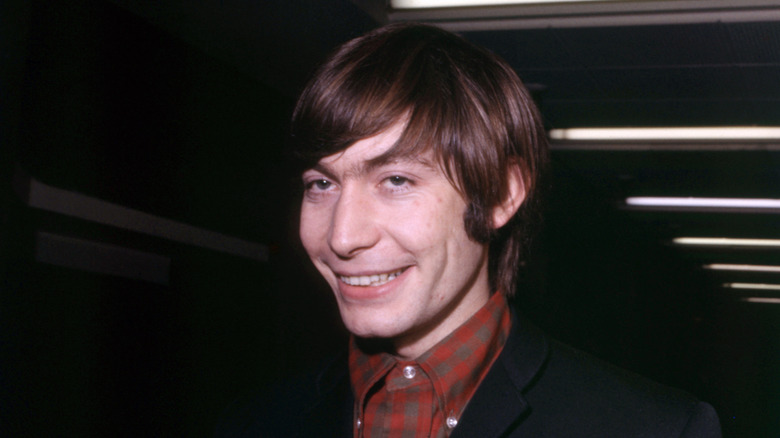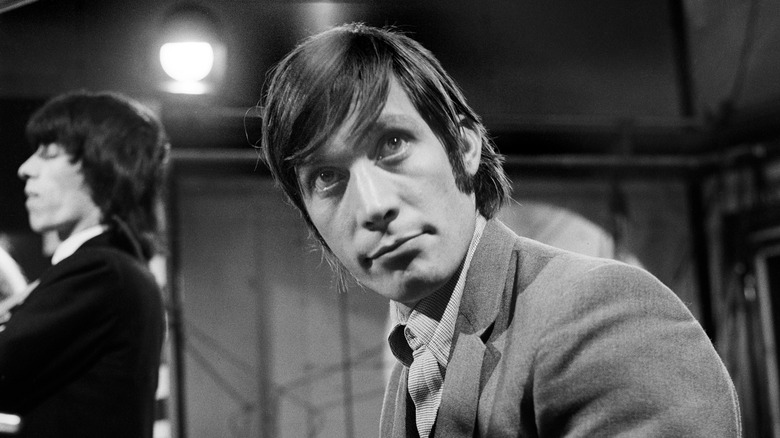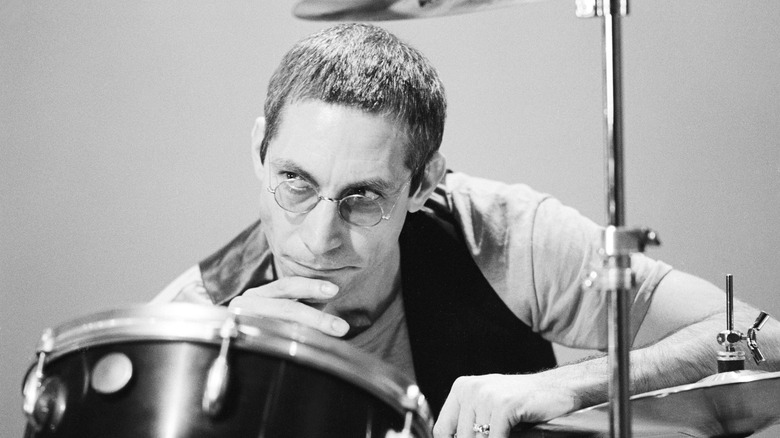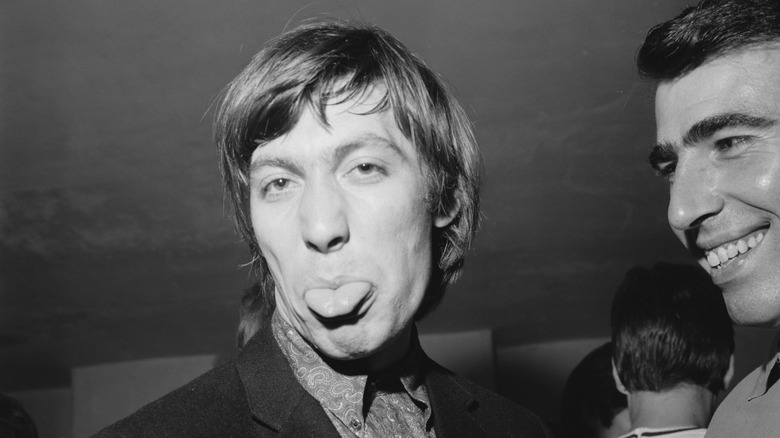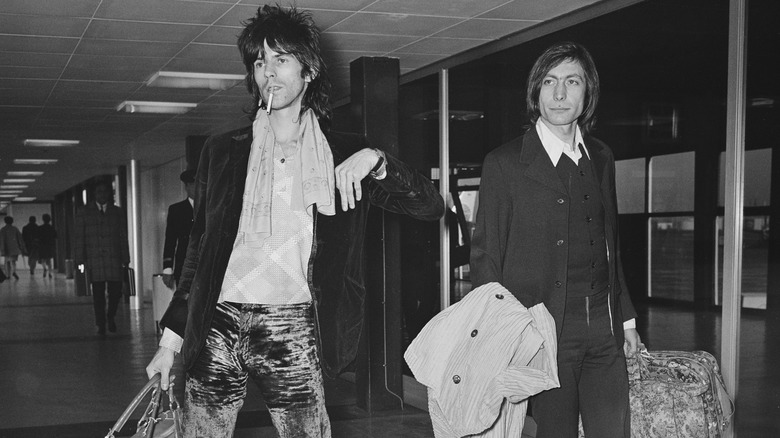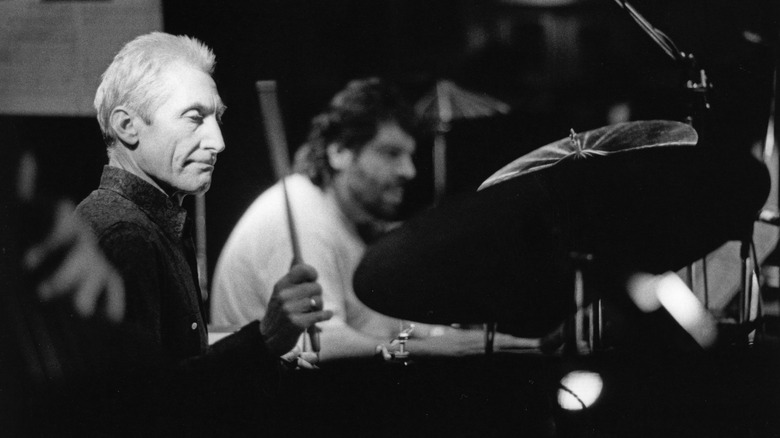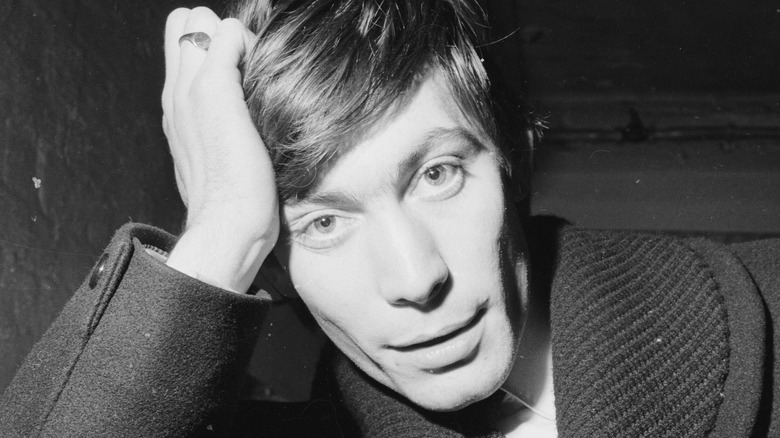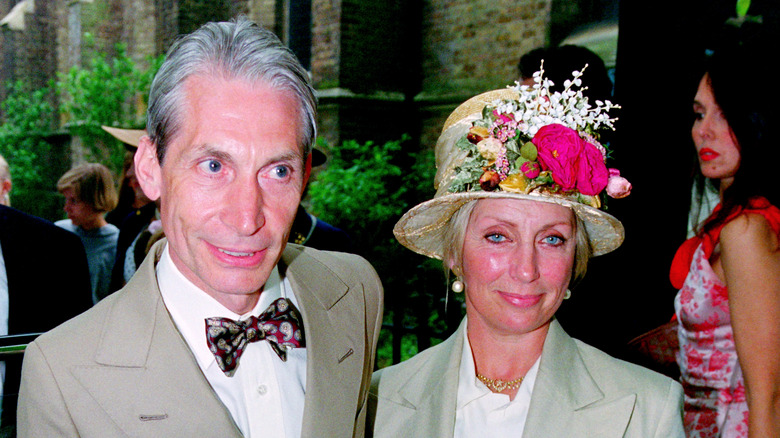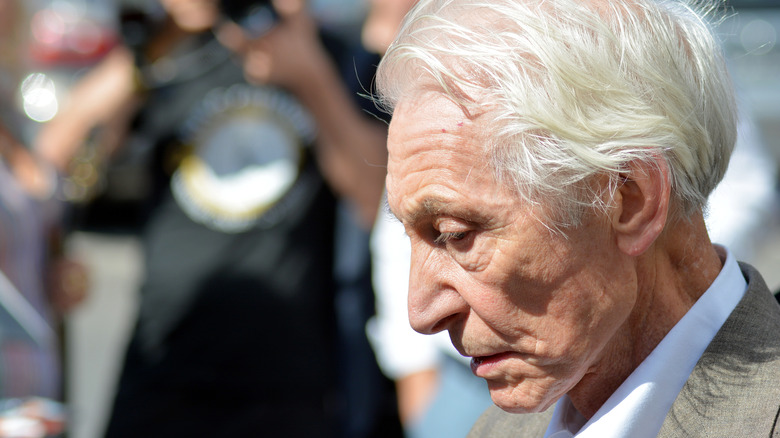The Untold Truth Of Charlie Watts
With his impeccable suits and calm manner, Charlie Watts resembled a member of the English gentry more than a member of the world's arguably greatest rock band. Regardless, his equally impeccable rhythm and beat provided the backbone of the Rolling Stones from the band's formation in 1963 to his death in 2021 (per the BBC).
As a member of one of the greatest bands in rock history, Watts had every possibility to become a flashy, debauched, and dangerous rock star. Perhaps that's why it's so impressive that the musician shunned the celebrity life by his own volition, opting instead to focus on music and let others do the talking and the posing. In fact, as he once told the San Diego Union-Tribune, he somehow managed to be in the increasingly famous band for years before he felt the need to step in front of journalists — to promote his jazz band side hustle. "I never spoke to the press for 20 years until I had my orchestra," the drummer said.
Content though he was to remain in the background and play his instrument, Watts nevertheless left a lasting mark in pop culture, and his work influenced many that came after him. In the wake of his passing in 2021, it's time to take a reverent look at the untold truth of Charlie Watts.
The Rolling Stones almost couldn't afford him
Born during WWII in 1941, Charlie Watts grew up in post-war Britain, and developed an affinity to jazz music early on (per the BBC). He got his first drum kit at age 13, though, as the New Yorker notes, he also dabbled in DIY percussion by building a makeshift snare drum out of a banjo. By the time he was 20, Watts was already making a name for himself in a blues band called Blues Incorporated (via MusicRadar).
The Rolling Stones realized early on that Watts' jazzy swing was the missing piece for their sound, but there was one problem. Watts was perfectly happy with his various other gigs about town, so he set a hard condition for joining Keith Richards and the others: A solid wage of £5 a week (£84.18, or a little under $116 in today's money). That was big bucks for a penniless rock group taking its first steps, and as Richards wrote in his 2010 autobiography "Life" (via Esquire), the Stones had to take drastic measures to be able to recruit the drummer. "We starved ourselves to pay for him!" the guitarist wrote. "Literally. We went shoplifting to get Charlie Watts."
Charlie Watts' surprising day job
Even if the whole music thing hadn't panned out for Charlie Watts, he would most likely have turned his artistic endeavors into a career. Per the New Yorker, Watts was an art school graduate who was already working as a graphic designer when he was making a name for himself as a drummer.
As the Guardian tells us, the rock star later harnessed his experience as a designer for the Charles Daniels advertising agency for the Rolling Stones' benefit, as he was a significant presence in their visual style. He had a hand in the band's stage design for a number of tours, as well as some of their album artwork. In the latter capacity, per Time, he once accidentally named one of the band's albums, "Between the Buttons," after being told the phrase when he asked for the album's title, and going off to work on the album art without realizing it was a slang term that meant "undecided."
Watts once told GQ that his eye for design even extended to the fine suits he famously wore. When the interviewer asked who designed the suit he was wearing at the moment, Watts casually replied: "Me!"
Charlie Watts' strange tour hobby
What does a member of the Rolling Stones do with their downtime on tour? Keith Richards or Mick Jagger might have spent years on end earning their collective "Glimmer Twins" nickname (via Rolling Stone), but Charlie Watts' interests were simultaneously both far more pedestrian and infinitely stranger than mere partying: he sketched hotel rooms.
Thanks to his background as a graphic designer (via the New Yorker), Watts could draw quite well, and in 1961 he even wrote and illustrated a children's book inspired by jazz legend Charlie Parker, "Ode to a Highflying Bird" (via Rolling Stones Data). According to Rolling Stone, the drummer kept his sketching skills sharp in a rather peculiar manner. "I keep a diary of drawings," he said in 1996. "I've drawn every bed I've slept in on tour since 1967. It's a fantastic nonbook. I used to take a lot of things that keep you awake, and I'd have nothing to do. So I have all these hotel rooms recorded."
Though Watts was quick to admit that this hobby isn't exactly topping the list of exciting rock star activities, he insinuated that he both appreciated and dreaded its repetitive nature. "What's nice about it is, it's visual, and it just goes on and on, and you think, 'Is this ever gonna end?'" he said. "You've got Washington in '67 and then you've got Washington a couple of years ago, and they're kind of the same."
Charlie Watts, private dancer
It's easy to be seen as the stoic one when your band members include notoriously colorful characters Mick Jagger and Keith Richards, but even if you replaced the Glimmer Twins with choirboys, one might argue that Charlie Watts would still come across as the strait-laced one. However, as I Love Classic Rock tells us, the Rolling Stones drummer could dance and shake it just as well as his more flamboyant colleagues ... it just so happens that Watts preferred to save his moves for backstage, out of sight for the audience.
As this YouTube video shows, Watts had a habit of preparing for a concert by performing a cool little dance that looked very different from his stoic stage presence, usually just before he stepped on stage. On many occasions, this endearing performance was evidently witnessed by Richards, who watched his bandmate's moves while grinning from ear to ear, while occasionally joining the dance himself. Wouldn't you?
Keith Richards considered Charlie Watts the most important member of the Rolling Stones
Who would you say is the most important musician in the history of The Rolling Stones? It's easy to point the finger at frontman Mick Jagger and his magnetic charisma, or immensely talented guitar legend Keith Richards and his effortless cool. However, if you ask Richards, both answers are wrong (via Rolling Stone).
"Everybody thinks Mick and Keith are the Rolling Stones," the guitarist said in 1979. "If Charlie wasn't doing what he's doing on drums, that wouldn't be true at all. You'd find out that Charlie Watts is the Stones." This was far from the only time Richards expressed his view about Watts as the band's single most important member. "When we got Charlie, that really made it for us," he once said about Watts' decision to join the Stones (per Rolling Stone).
Knowing this, it was perhaps surprising when the Rolling Stones announced that they'd continue to tour after Watts' death (per NME), with Steve Jordan set to sit behind the drums. Of course, it must be noted that Jordan — a longtime collaborator of Richards' — is a highly talented drummer in his own right, and was already announced as Watts' temporary replacement when health issues sidelined the Stones drummer in August 2021, per Ultimate Classic Rock. In fact, Jordan already acted as a brief studio replacement for Watts in 1986, and Watts himself was first impressed by him way back in 1978.
Charlie Watts and style
Charlie Watts was not one to give too many interviews, but that doesn't mean he couldn't talk at length about subjects that he liked — such as jazz and his personal style (via GQ). In fact, in 2012 he revealed that the two are more related than you might assume. " The lovely thing about jazz guys in that period — the fifties and sixties — was that they were very handsome men — Duke Ellington, Lester Young, Charlie Parker, Miles Davis — but they were also very stylish," he described how his well-dressed jazz heroes influenced his personal affinity for a nice suit. He also revealed that he had two tailors, and an estimated 200 suits ... in London alone.
Though Watts clearly knew his style and wore it with great elegance, he admitted that what he thought of as his "old-fashioned and traditional mode of dress" didn't quite mesh with the rest of the Rolling Stones' aesthetics. "I always felt totally out of place with the Rolling Stones," Watts said. "Not as a person — they never made me feel like that. I just mean the way I looked. Photos of the band would come back — I'll have a pair of shoes on and they've got trainers."
Charlie Watts' true musical love was jazz
It's no surprise that outlets like the BBC and the Guardian both included the word "jazz" but not the words "The Rolling Stones" in the headlines of their obituaries for Charlie Watts. After all, the man himself didn't exactly hide his affinity for the genre. As he told Rolling Stone in 2013, Watts was so deep in the jazz world when he joined the Rolling Stones that Keith Richards actually had to give him lessons on the subject of rock n' roll. "While [the other band members] were all going on about John Lee Hooker and all these other marvelous people [like] Muddy Waters, I'd be putting Charlie Parker and Sonny Rollins in," Watts said. "That's what I was into when I joined the Rolling Stones, that's what I used to listen to. Keith taught me to listen to Elvis Presley, because Elvis was someone I never bloody liked or listened to."
Don't think that Watts forgot his jazz roots when he rose to the upper echelons of rock stardom, either. He embraced the similarities he saw between his beloved jazz and his more rocking day job and brought his jazz sensibilities to the sound of the Stones. What's more, his musical output outside the Rolling Stones consisted of a number of well-received jazz albums with various outfits.
Charlie Watts struggled with alcohol and heroin
Charlie Watts always seemed like the steadiest, most stable Rolling Stone by a considerable margin. However, as the Guardian tells us, these optics briefly hid a very different truth in the 1980s, when a rough patch with the band coincided with some turmoil in his personal life. Watts responded to the stresses of the world by turning to heroin and alcohol.
"Maybe towards the end of 1986, I hit an all-time low in my personal life and in my relationship with Mick," Watts said. "I was mad on drink and drugs. I became a completely different person, not a nice one. I nearly lost my wife and family and everything."
The drummer was eventually able to conquer his demons, and credited his wife for anchoring him. "I just stopped cold – for me and for my wife. It was never me, really," he told Rolling Stone. He also shared a story about losing consciousness in the studio during his worst times, which was such a slight that Keith Richards actually reprimanded him. "I passed out, and Keith picked me up – this is Keith, who I've seen in all sorts of states doing all sorts of things – and he said to me, 'This is the sort of thing you do when you're 60.'"
If you or anyone you know is struggling with addiction issues, help is available. Visit the Substance Abuse and Mental Health Services Administration website or contact SAMHSA's National Helpline at 1-800-662-HELP (4357).
Charlie Watts kept his marriage a secret
It's not entirely unheard of for a famous musician to have secret romantic adventures. However, Charlie Watts wasn't a typical rock star, so it makes sense that his particular take on the subject was far from ordinary. Per the Independent, Watts married Shirley Shepherd way back in 1964, and they remained together until his death.
At first, the drummer felt that his marital status might be bad for the band's image, so he decided to keep it secret — from the fans and the band. Evidently, the truth came out to the rest of the Rolling Stones before long, seeing as Watts eventually started taking Shirley along on tours despite the band's rules technically forbidding this (per People). Apparently, there's no stopping a drummer in love.
An interesting fact about Watts' marital life is that his wife reportedly likes the Stones' music far more than he, the group's actual drummer, did. "My wife and daughter may come out on tour, but Shirley's always had other things outside of this band," Watts said. "She's a great fan of the Stones, though. I'm not; it's what I do. Mick and Keith and Ronnie are my friends and the band is a very good one, but that's it. But Shirley actually plays our records. I don't."
The death of Charlie Watts
Charlie Watts had a major health scare in 2004, when he had to undergo two operations to deal with throat cancer (per Ultimate Classic Rock), and the drummer has said that the situation caused him to face his mortality. "It was benign, but [the doctor] said we should take it out," Watts said about the moment he received his diagnosis. "On the slide, it had tiny cancer cells on it. He said, 'You have cancer of the whatever.' And that night I thought I was going to die. I thought that's what you did. You get cancer and waste away and die." Fortunately, Watts' treatment was successful that time.
However, another pressing health situation in 2021 had a less fortunate end. As Reuters tells us, Watts pulled out of the Rolling Stones' "No Filter" tour on August 4 due to an "emergency medical procedure" that left him unable to perform with the band. On August 24, the Rolling Stones announced Watts' death in a short statement (via the Rolling Stones' official Twitter account) that said he had "passed away peacefully in a London hospital earlier today surrounded by his family." The legendary drummer was 80 years old when he died.
Charlie Watts was a drummer's drummer
Charlie Watts was a respected drummer before he even joined the Rolling Stones, and his skills were such that Rolling Stone once listed him as the 12th best drummer of all time. Over the years, he developed a legendary reputation among his peers, and the list of drummers who were lining up to sing his praises after his death was a who's who of percussive greats.
Max Weinberg of the E Street Band and Stewart Copeland of The Police fame gushed about Watts' technique for the Guardian. Metallica's Lars Ulrich named the Rolling Stones drummer one of his premiere influences (via Rolling Stone). Chad Smith of the Red Hot Chili Peppers reminisced about the day he unexpectedly ended up in a long and technical conversation about drum kits with Watts, as well as a later date when he got to spend an entire day with him (per Rolling Stone). The Beatles drummer Ringo Starr was such great friends with Watts that he said: "Ninety thousand people called me to tell me he was gone. It's a shame. He was a beautiful human being" (via the Wall Street Journal).
All of these men, you'll notice, are superstars of their respective, often very different genres — yet, they all have one thing in common. They thought the world of Charlie Watts, both as a person and as a drummer. Now, that's a legacy.

